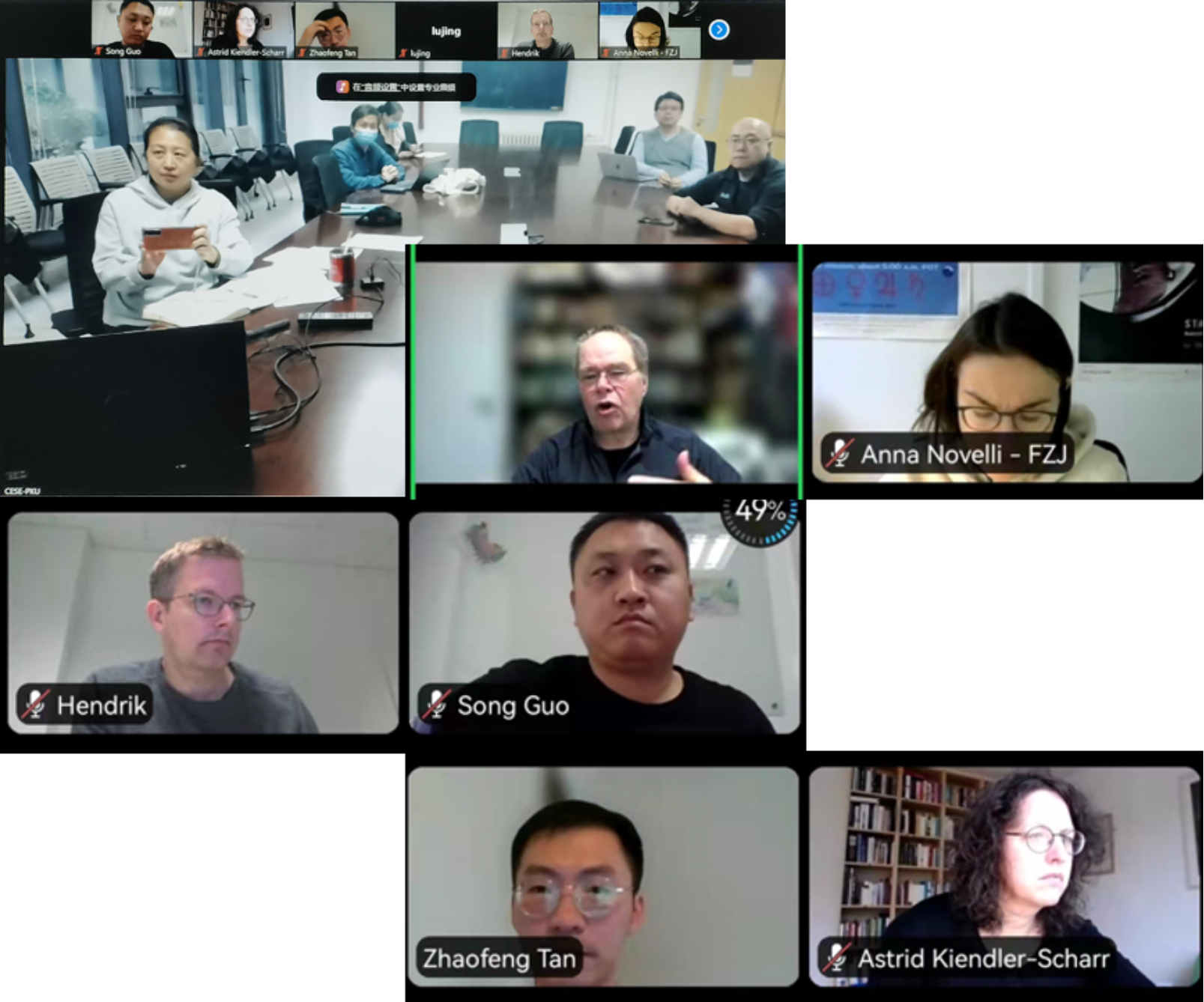受疫情影响,区域污染控制国际合作联合实验室(以下简称IJRC)的国际交流受到很大限制,国际交流克服困难,扩展线上交流模式进行。11月17日下午,IJRC室务会就未来工作计划进行研讨。德国于利希研究中心Andreas Wahner教授(IJRC德方主任), Astrid Kiendler-Scharr教授, Anna Novelli研究员、Hendric Fuchs研究员,澳门永利6774·com的胡敏教授(IJRC中方执行主任)、曾立民教授、李歆研究员、陆克定研究员、刘永研究员(学院主管国际交流副院长)、郭松研究员、戴瀚程研究员,访问学者谭照峰博士等参加了会议。
IJRC执行主任胡敏教授首先回顾了IJRC联合实验室的组织架构、研究方向、运行机制、人才培养与运行管理等内容;对照教育部对国际合作联合实验室的验收要求,总结了IJRC进展;近3年中德双方合作的暑期学校深受研究生的欢迎,大气化学和大气环境知识系统又兼顾前沿,而且由1+1扩展到多家院校和研究所,收效明显。尽管受疫情影响,研究人员和学生互访受限,一定程度上影响了合作研究,但近3年合作发表文章20篇,推动合作往纵深发展。

参会人员截屏/Screenshot of participants online
会上,大家广开思路,对IJRC实验室建设及后期发展以及2022年的工作展开实质性讨论,包括:
(1)计划于2022年4-5月和6-7月分别在合肥和成都开展两次外场综合观测实验,由中方负责具体实施,德方通过提供一线科研人员、在线测量设备、远程数据分析与讨论等形式参与;
(2)以中方设计、德方实施的形式联合在德国SAPHIR烟雾箱中开展化学反应机制实验,作为相关博士生论文工作的重要组成部分;
(3)持续推进现有德国暑期学校《大气化学与物理》课程的远程教学,并考虑在此基础上联合开办中德《大气化学与物理》网络课程,以中德科学家为主遴选全球优秀科学家授课、全面升级为《大气污染与气候变化》和《碳中和研究》暑期学校等;
(4)在2022年欧洲地球物理学会(EGU)年会上联合举办大气自由基化学专场讨论;基于已有和待开展的外场观测和实验室模拟实验,在国际期刊上组织学术专刊;
(5)双方将考虑线上线下相结合联合举办面向环境污染防治、气候变化与碳中和的高水平国际论坛,持续提升联合实验室的国际影响力;
(6)明年是中德建交50周年,北大将考虑与德国驻华大使馆、Hemholtz联合会北京办事处等举行北大-于利希合作纪念与学术交流活动。
在疫情的当下,保持定期和不定期线上沟通和交流是合作的基础,中德双方将定期召开交流会和研讨会,共谋发展策略,把联合实验室建设好。
IJRC Work Plan Discussed Online
The international exchanges between members of International Joint Laboratory of Regional Pollution Control (IJRC) were greatly restricted due to the wide spread of the COVID-19 pandemic. Both sides of IJRC, the College of Environmental Sciences and Engineering of Peking University (CESE-PKU) and Forschungszentrum Jülich (Jülich), have been trying best to establish mutual online contact. The IJRC future work plan workshop was held via ZOOM on November 17. Prof. Andreas Wahner, IJRC Dean of German counterpart, Prof. Astrid Kiendler-Scharr, Dr. Anna Novelli and Dr. Hendric Fuchs etc. from Jülich and Prof. Min HU, IJRC Executive Dean, Prof. Limin Zeng, Dr. Keding LU, Dr. Yong LIU (Vice Dean of CESE in charge of international exchanges), Dr. Song GUO, Dr. Xin LI, Dr. Hancheng DAI from CESE-PKU, and visiting scholar Dr. Zhaofeng Tan attended the meeting.
Firstly, Prof. Min HU reviewed the structure, research orientation, operation mechanism and joint educational program of IJRC. She summarized recent achievements according to the acceptance requirements of China MOE (Ministry of Education). After that, she introduced the success of summer school in recent 3 years organized by both sides, which was welcomed by more and more students not only from both sides but from institutes and universities home and abroad. Though personnel exchanges were somewhat affected by the pandemic that to some degree hindered joint research work, IJRC still achieved outstanding research progress with up to 20 joint papers published, strengthening cooperative link between two sides.
Attendants exchanged viewpoints freely and extensively on IJRC future development and construction. The main topics were as follows:
(1) To carry out field campaigns respectively during April and May in Hefei and during June and July in Chengdu with CESE-PKU as the main task undertaker, Jülich side will offer online instrument measurements and data analysis.
(2) To conduct chemical reaction mechanism experiments in SAPHIR chamber in Germany with CESE-PKU design- Jülich implementation mode.
(3) To continue to organize online compact course “Atmospheric Chemistry and Dynamics”, with “Atmospheric Chemistry and Physics” as an alternative, inviting excellent world-recognized scientists as lecturers, and upgrade the summer school to focus on “ Atmospheric Pollution and Climate Change” or “Carbon Neutrality”.
(4) To hold a specialized seminar on atmospheric OH chemistry at EGU annual conference in 2022 and to organize special issues at international journals.
(5) To hold high-level international forum oriented at environment pollution control or climate change and carbon neutrality with both online and offline meeting so as to further improve the joint lab’s international influence.
(6) With the 50th anniversary of the establishment of Sino- German diplomatic relations to come in 2022, CESE-PKU intends to unite the Germany Embassy in China and Hemholts Association Beijing Office to hold academic exchange activities.
Both sides agreed that under the circumstances of COVID-19 pandemic, keeping regular and timely online exchanges and communications is extremely important for building up the joint laboratory. The consensus was reached to have regular meetings to keep updated with each other’s research progress with the aim to better construct IJRC.
